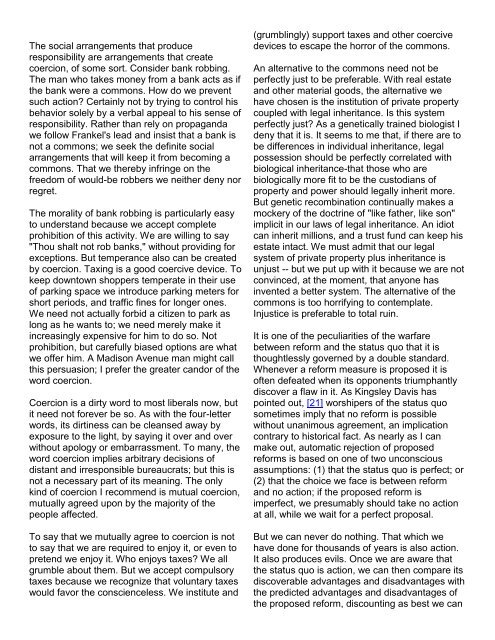The Tragedy of the Commons What Shall We Maximize?
The Tragedy of the Commons What Shall We Maximize?
The Tragedy of the Commons What Shall We Maximize?
Create successful ePaper yourself
Turn your PDF publications into a flip-book with our unique Google optimized e-Paper software.
<strong>The</strong> social arrangements that produceresponsibility are arrangements that createcoercion, <strong>of</strong> some sort. Consider bank robbing.<strong>The</strong> man who takes money from a bank acts as if<strong>the</strong> bank were a commons. How do we preventsuch action? Certainly not by trying to control hisbehavior solely by a verbal appeal to his sense <strong>of</strong>responsibility. Ra<strong>the</strong>r than rely on propagandawe follow Frankel's lead and insist that a bank isnot a commons; we seek <strong>the</strong> definite socialarrangements that will keep it from becoming acommons. That we <strong>the</strong>reby infringe on <strong>the</strong>freedom <strong>of</strong> would-be robbers we nei<strong>the</strong>r deny norregret.<strong>The</strong> morality <strong>of</strong> bank robbing is particularly easyto understand because we accept completeprohibition <strong>of</strong> this activity. <strong>We</strong> are willing to say"Thou shalt not rob banks," without providing forexceptions. But temperance also can be createdby coercion. Taxing is a good coercive device. Tokeep downtown shoppers temperate in <strong>the</strong>ir use<strong>of</strong> parking space we introduce parking meters forshort periods, and traffic fines for longer ones.<strong>We</strong> need not actually forbid a citizen to park aslong as he wants to; we need merely make itincreasingly expensive for him to do so. Notprohibition, but carefully biased options are whatwe <strong>of</strong>fer him. A Madison Avenue man might callthis persuasion; I prefer <strong>the</strong> greater candor <strong>of</strong> <strong>the</strong>word coercion.Coercion is a dirty word to most liberals now, butit need not forever be so. As with <strong>the</strong> four-letterwords, its dirtiness can be cleansed away byexposure to <strong>the</strong> light, by saying it over and overwithout apology or embarrassment. To many, <strong>the</strong>word coercion implies arbitrary decisions <strong>of</strong>distant and irresponsible bureaucrats; but this isnot a necessary part <strong>of</strong> its meaning. <strong>The</strong> onlykind <strong>of</strong> coercion I recommend is mutual coercion,mutually agreed upon by <strong>the</strong> majority <strong>of</strong> <strong>the</strong>people affected.To say that we mutually agree to coercion is notto say that we are required to enjoy it, or even topretend we enjoy it. Who enjoys taxes? <strong>We</strong> allgrumble about <strong>the</strong>m. But we accept compulsorytaxes because we recognize that voluntary taxeswould favor <strong>the</strong> conscienceless. <strong>We</strong> institute and(grumblingly) support taxes and o<strong>the</strong>r coercivedevices to escape <strong>the</strong> horror <strong>of</strong> <strong>the</strong> commons.An alternative to <strong>the</strong> commons need not beperfectly just to be preferable. With real estateand o<strong>the</strong>r material goods, <strong>the</strong> alternative wehave chosen is <strong>the</strong> institution <strong>of</strong> private propertycoupled with legal inheritance. Is this systemperfectly just? As a genetically trained biologist Ideny that it is. It seems to me that, if <strong>the</strong>re are tobe differences in individual inheritance, legalpossession should be perfectly correlated withbiological inheritance-that those who arebiologically more fit to be <strong>the</strong> custodians <strong>of</strong>property and power should legally inherit more.But genetic recombination continually makes amockery <strong>of</strong> <strong>the</strong> doctrine <strong>of</strong> "like fa<strong>the</strong>r, like son"implicit in our laws <strong>of</strong> legal inheritance. An idiotcan inherit millions, and a trust fund can keep hisestate intact. <strong>We</strong> must admit that our legalsystem <strong>of</strong> private property plus inheritance isunjust -- but we put up with it because we are notconvinced, at <strong>the</strong> moment, that anyone hasinvented a better system. <strong>The</strong> alternative <strong>of</strong> <strong>the</strong>commons is too horrifying to contemplate.Injustice is preferable to total ruin.It is one <strong>of</strong> <strong>the</strong> peculiarities <strong>of</strong> <strong>the</strong> warfarebetween reform and <strong>the</strong> status quo that it isthoughtlessly governed by a double standard.Whenever a reform measure is proposed it is<strong>of</strong>ten defeated when its opponents triumphantlydiscover a flaw in it. As Kingsley Davis haspointed out, [21] worshipers <strong>of</strong> <strong>the</strong> status quosometimes imply that no reform is possiblewithout unanimous agreement, an implicationcontrary to historical fact. As nearly as I canmake out, automatic rejection <strong>of</strong> proposedreforms is based on one <strong>of</strong> two unconsciousassumptions: (1) that <strong>the</strong> status quo is perfect; or(2) that <strong>the</strong> choice we face is between reformand no action; if <strong>the</strong> proposed reform isimperfect, we presumably should take no actionat all, while we wait for a perfect proposal.But we can never do nothing. That which wehave done for thousands <strong>of</strong> years is also action.It also produces evils. Once we are aware that<strong>the</strong> status quo is action, we can <strong>the</strong>n compare itsdiscoverable advantages and disadvantages with<strong>the</strong> predicted advantages and disadvantages <strong>of</strong><strong>the</strong> proposed reform, discounting as best we can






